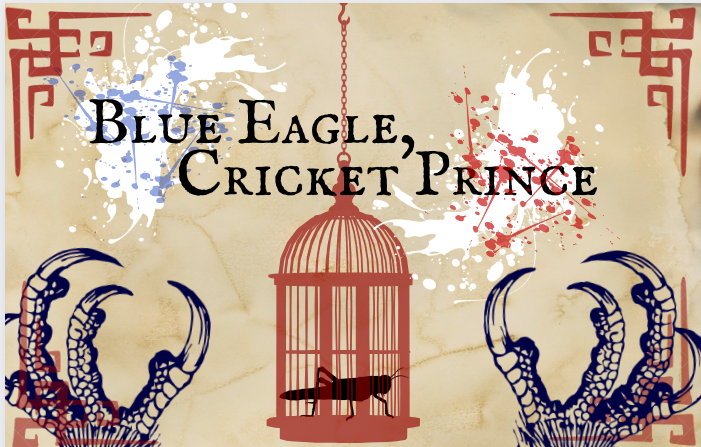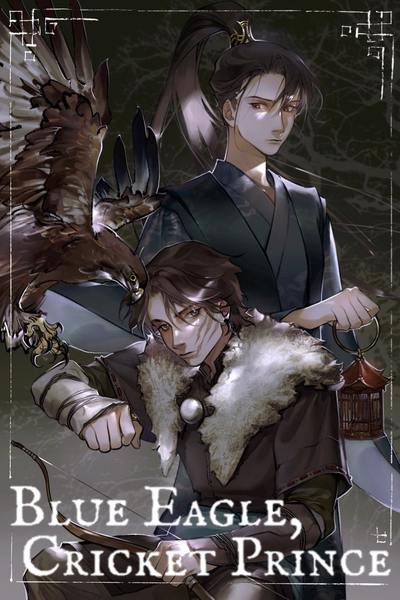The light refracted in myriad colours, as if after a rainstorm in the midday sun. The droplet of water was wobbling on the edge of the glass plate before him, where condensation had poured off a pile of berries chilled with ice. In it, the sunlight shone, and the red-painted pillars, and the forty court officials standing by. One of them was talking. His voice was like the low drone of a drunk fly around Zhisen’s ears, annoying, useless, unintelligible. Zhisen drummed his fingers on the table and watched the droplet bursting. He turned his gaze to the next-largest one, and tilted his head to the side until he could see the reflection of the court.
All of a sudden, he heard his name. He glanced up, looking at the officials, arranged in their squares of four by five men on either side of the marked path to the throne. It was one of them who’d said it, not Junsai or the Emperor, since the sound hadn’t come from his right.
Zhisen waited for the man to address him again, with an eyebrow raised.
After a silence of several long, drawn-out seconds, Gentry Feng asked, “Prince Zhisen, what is your opinion?” Zhisen figured that his lack of attention had been noticed, and that this was some kind of effort to ridicule him while also reinforcing the import of whatever it was Feng had been saying.
So, Zhisen said, “My apologies, but your tiresome drivel about whether we should buy swords from the best blacksmith even though his son apparently disrespected the lord of the land— your nephew, if I’m not mistaken?— is merely tiresome drivel, Gentry Feng.”
There was a silence. “That is not what I was saying, Your Highness.”
“Oh, beg your pardon. I must have confused it with the tirade of abuse you spouted at our smith before we started to see a shortage of new-sharpened blades in the armoury.” There was another profound silence, in which the Emperor gestured at a servant who ran off at once, probably to get a hold of the smith. Satisfied with that, Zhisen turned back to Feng. “What were you saying?”
“I was discussing with His Excellency the talk of the Diyin province’s Lord amassing forces in an effort to separate from the Empire.”
“Hearsay,” Zhisen said, “he’s afraid of the Reidan king. Take a look at the map— they are neighbours, and we are currently at war with Reidan. Lord Zhang’s motive to arm himself seems obvious.”
The Emperor addressed him. “Did you speak with Lord Zhang about this?”
“Naturally, I sent a man to gather information as soon as I caught wind of it. This news is old.”
Junsai sighed. “And did you not think to tell us before we wasted time listening to Gentry Feng?”
Gentry Feng looked like he was about to piss himself. Does he think I’ll have him executed merely for wasting my time? Well, maybe I should, but that’s a bit excessive. Zhisen said, “I was thinking.”
“Of what, Your Highness?” Gentry Feng asked, with the utmost politeness.
Zhisen decided to redeem him and spare him the Emperor’s impatience by saying it in his direction, sitting forward slightly. “It’s not that I don’t value your information, Gentry Feng. After all, perhaps you might have known something on the subject which I did not. But my mind is rather more occupied by wondering why I have not seen any mobilization of resources for the tribute payment to the Erdeni next week.”
There was a profound silence, until Junsai said, “You were recovering from injury, so I did not wish to disturb you with this news, brother.” Zhisen already knew what he was going to say, but he still felt newly and gloriously ticked off hearing it. “We have decided to go to war.”
Zhisen tried not to pick up the cup on his table and hurl it at Junsai’s head. “Pardon me?” Before anyone could repeat it to him, he asked, “Go to war? With the Erdeni? Ha! Shall we just have a funeral party tomorrow and commit suicide together? Or should I bring a torch and some oil, and we’ll go hand in hand and with an idiot smile on our faces to burn the Empire ourselves? Or do you think for some reason that we can actually conquer people who have no towns, and who are as free as flowing water between our fingers? No matter how much you grasp at a desert, you cannot hold it. The Erdeni steppe is the same.”
“We outnumber them seriously, Zhisen,” Junsai said. “And they cannot ride horses up Taaga.”
“And I likewise seriously overpower the pigeons in the courtyard, but they will fly away before I even unsheathe my sword. If I corner them somehow, they will flap their wings till I’m blind.”
Junsai put his cup of water down rather too firmly. “Enough with your poetry.”
“I think I am being supremely clear,” Zhisen said. “Fine— let us go to war. But is it wise to fight on two fronts? We’re at war with Reidan. That battle we may win or lose in equal probability. But if we raise our hands against the Erdeni— well, we are sure to lose both fights. Maybe we have the resources, maybe we have the men, and maybe we have the courage. But do we have the tactical advantage? No.”
“What would constitute a tactical advantage in your eyes?” Junsai asked, sounding impatient.
Zhisen tried not to pinch the bridge of his nose. I don’t know, a complete map of their territories? Which would only be useful if they had villages. Which they don’t. So, nothing ‘possible’ is an advantage! What should I say, you headstrong fool? Instead of all that, he asked instead, “Before we talk military strategy, enlighten me as to why we have decided that war is the best course right now?”
Junsai looked at him as if he’d lost his mind. “Was it not your neck that was sliced in front of our father, when he’d been so disrespected by that barbarian as to be threatened into stepping off the throne? Was it not the heir of the Erdeni Confederation who summoned the hostility to exert dominance over the Son of Heaven through your bloodshed? Was this not a deliberate provocation?”
“I did that with my own hands, by giving him my neck to put a knife to,” Zhisen insisted. “If vengeance will be sought upon anyone for disrespecting our father, it is me. And if we are going to speak logically, it was our court’s decision to ban market trade with the Erdeni that was the first provocation. I warned you then and I’ll remind you again now— just because we pay them tribute, that does not mean that they will not seek to trade in our markets. Market exchange is equal, even if tribute is not, and even if we were economically justified in that ban, it can and was indeed interpreted as a deliberate hostility.”
The Emperor was rubbing his temples, but at that he said, “Enough— both of you, quiet.”
Zhisen shut his mouth, and Junsai swallowed his retort, sitting back with a tight jaw. For a few seconds, their father was quiet, but just when it seemed that one of the officials was going to try to start the conversation again, he spoke. “He who steals an egg will steal an ox. Khojin Adkirag spilled your blood shallowly this time, but how much will flow the next?”
Junsai was quick to support this. “Zhisen, listen to reason. I understand your concerns, but if we do not have a tactical advantage, when have we been incapable of making one? Let’s work together.”
He realized that he only had a few moments to consider the matter, but he tried to think of what advantage a war with the Erdeni could possibly bring him. Then, when he glanced sidelong at a map which showed their empire and the bordering kingdoms, his gaze snagged on the Reidan kingdom. Could I pull off the same thing, but not to the same extent? he wondered, and met Junsai’s eyes. Probably. Junsai looked at him imploringly, but he was imploring far more than ‘let it slide.’ Zhisen weighed the risks, then decided and spoke. “It is clear to me that I cannot dissuade you all. However, allow me to present two suggestions.”
“Go on,” Emperor Haoda said.
“First, leave the men of Woqin province out of the fight for now. They are foremost the men of my lands, and it is not my wish to subject people for whom I am personally responsible to a war which I believe to be foolish. But, more importantly to the interests of the Empire— my personal feelings aside— it is Woqin which produces the greatest annual harvest of rice. If we are to divert resources from the other provinces to war, then let us work my land more intensively to mitigate losses for ration distribution to both the general populace and the troops. The Igtze and Shanhin rivers make the capital city easily defensible, so we can reduce the presence of soldiers in the region, too.”
Junsai looked as if he wanted to protest, but Gentry Donghai said, “Most reasonable, Your Highness.”
“Yes, indeed,” Gentry Su interjected. “Your suggestion is both astute and morally sensible, Prince Zhisen."
Zhisen ignored them. It was funny, though, that Donghai lavished him such flattery without having worked out the extent to which Zhisen was suspicious of him. “My second suggestion is that we offer the Erdeni peace on the grounds that they formally and publicly apologize for offending the Emperor, at the next tribute.”
There was some quietude. Nobody seemed to know whether they should praise the generosity of the suggestion for its morality or reject it on the basis that the Emperor was too offended to accept apologies. Naturally, none of them could tell whether Emperor Xian was personally offended or offended on Zhisen’s behalf. His face was serene and betrayed nothing, but he did grace them with an answer after leaving them anxious for long enough that Zhisen almost laughed. “It is an admirable idea, Zhisen— but how might we achieve this without sending a messenger who will ride back stuck to his saddle by an arrow?"
After taking a drink of water, Zhisen said, “I’ll go.”
The court burst out in an uproar of myriad protests, and even his father looked taken aback. In the end, though, it was Junsai who spoke above the exclamations of the officials. “Zhisen.” His voice shut everyone up, and then he asked, “Were you not just now advising caution in this undertaking?”
“Find me someone with similar practice in their language and more desire for peace,” Zhisen said, gesturing loosely at the officials. “And then I will send that individual in my place.”
Junsai held his gaze for one moment longer before with a sigh he turned his head down, wiping his face. Emperor Xian asked him, “How many men will you take with you?”
“None,” Zhisen said, and the officials started murmuring amongst themselves again. “Silence.” They shut up promptly. “But please, go on and talk if you doubt my judgment.” The quite stretched awkwardly, and Zhisen turned back to his father, explaining, “If I take soldiers with me, they will think I mistrust them, that I think them as barbaric as they are.” Zhisen didn’t really think they were all barbarians; it would be most simple of him to generalize. However, that was the opinion of the court, and he had to cater to their tastes in order to get their attention. “Let’s not do anything that can be misinterpreted. Sending a lowly messenger fails to show the extent of our sincerity. If they agree to apologize, then we resolve all the issues you have presented to me here about ‘disrespect’ and ‘obedience’ and Khojin Adkirag cutting me. We should never be hasty to go to war— even if we know how unlikely it is that they will take our offer of peace, it is prudent to show that we would rather avoid conflict than that we are hungry for bloodshed.”
“I understand what you are saying,” Gentry Wu said, “but if they are hostile?”
Zhisen asked, “Did Khojin Adkirag not ask for a messenger to bring our hide requests to them? I wager his party is camped out on the road to the border with the steppe. They won’t shoot this messenger, so I’ll go in his stead. Prepare the list for me, and I’ll ride out the day after tomorrow. Don’t expect me back too soon. It is likely that I will need to travel far into their territory to speak with Chief Tolon.”
“Even if they will not shoot the messenger, Your Highness…” Gentry Feng shifted his weight between his feet anxiously. “Are you sure that you should not bring at least four or five guards?”
He sighed. “Five men is an entire hunting party. You need only one man to deliver a message.”
It was Gentry Su who interjected next. “But, Your Highness, think about your safety—”
Knowing it would only be enough to show his impatience, Zhisen set down his cup loudly. Gentry Su flinched, and Zhisen spoke with a threatening smile. “If you doubt my martial prowess, shall we spar? I could indeed use some invigorating exercise after so much time spent poring over tax records to catch the thieves amongst the minor nobility which slipped through revision mysteriously. Shall we?”
Junsai was covering his laughter with his hand, and Emperor Xian looked tired of the meeting.
Since Gentry Su did not dare to answer him, Zhisen got to his feet. “Then, are we finished? My wife is waiting for me, as I promised her dinner. It would be rude to keep her waiting any longer if we are agreed.”
None of the court officials had anything else to contribute, and Junsai made a dismissive gesture as if to tell him all was well. Emperor Xian concluded the meeting by saying, “Gentry Donghai, prepare the list for the tribute. Junsai, mobilize your men to gather resources for the tribute next week. Zhisen, you have my permission to ride out the day after tomorrow, but come to the central gardens two hours to noon tomorrow. I wish to discuss certain matters of import with you, and equalize our Go score.”
Everyone bowed to him, including Zhisen, who said, “It would be my pleasure, Father.”
“Dismissed,” Emperor Xian finished, and all departed.
On the way down the stairs, Junsai caught up to Zhisen and fell into step beside him. In an undertone, he asked, “Must you always pretend to debate with me in these meetings?”
“In this case, I was not pretending,” Zhisen told him.
“Don’t tell me you have some kind of sympathy for those coarse bandits.”
“I don’t,” Zhisen said, “but payment in death is never enough. There is so much blood to spill in the world that it will never stop flowing. War should not be pursued lightly, even if there is provocation.”
Junsai was quiet for a moment, before with a sigh he patted Zhisen’s shoulder. “You sound more like Ziying every day.” A chill raced up Zhisen’s spine, but he forced himself not to flinch. “Before you go, will you join me tomorrow evening? To review the battle plans with Reidan, that is.”
Zhisen inclined his head as they came to the path where they would go separate ways. “Of course.”
“Excellent,” Junsai said with a smile, and gave his bicep a firm squeeze before heading off.













Comments (3)
See all